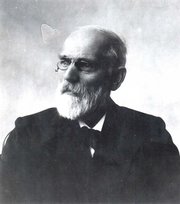Johannes Diderik van der Waals
|
|
Johannes Diderik van der Waals (November 23, 1837 – March 8, 1923) was a Dutch scientist famous "for his work on the equation of state for gases and liquids", for which he won the Nobel Prize in physics in 1910. Van der Waals was the first to realise the necessity of taking into account the volumes of molecules and the intermolecular forces (now generally called "van der Waals forces") in establishing the relationship between the pressure, volume and temperature of gases and liquids.
| Contents |
Life
Van der Waals was born in Leiden, the Netherlands, as the son of Jacobus van der Waals and Elisabeth van den Burg. He became a school teacher, and later was allowed to study at the university, in spite of his lack of education in the field of classical languages. He studied from 1862 to 1865, earning degrees in mathematics and physics. He was married to Anna Magdalena Smit and had three daughters and one son.
In 1866, he became director of a secondary school in The Hague. In 1873, he obtained a doctorate degree for his thesis entitled "Over de Continuïteit van den Gas- en Vloeistoftoestand" (On the continuity of the gas and liquid state). In 1876, he was appointed the first professor of physics at the University of Amsterdam.
Van der Waals died in Amsterdam in 1923.
Related topics
See also
External link
- Nobel biography (http://www.nobel.se/physics/laureates/1910/waals-bio.html)de:Johannes Diderik van der Waals
es:Johannes Diderik van der Waals fr:Johannes Diderik van der Waals it:Johannes Diderik van der Waals nl:Johannes Diderik van der Waals ja:ヨハネス・ファン・デル・ワールス pl:Johannes Diderik van der Waals sl:Johannes Diderik van der Waals sv:Johannes Diderik van der Waals

